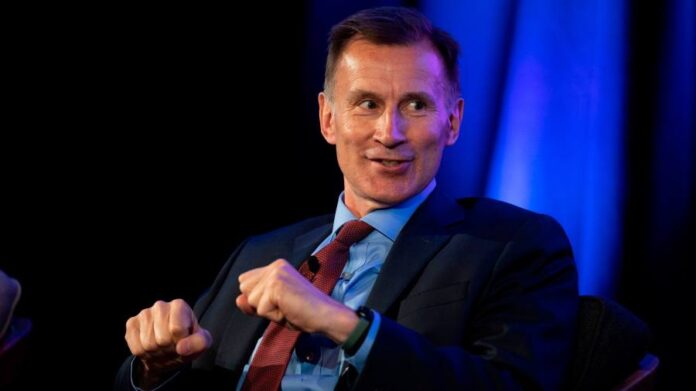Jeremy Hunt, chancellor, has announced a new drive to improve poor productivity in the public sector, warning that without reform the state will outgrow the economy and dash hopes of long-term tax cuts.
Hunt said that raising output from public services was key to stabilising the public finances, highlighting official forecasts that public sector debt could more than double to 217 per cent of gross domestic product by 2071 without any action.
John Glen, the Treasury chief secretary, will lead what Hunt called “the most ambitious public sector productivity review ever undertaken by a government”, reporting back in the autumn.
The national statistician, head of the UK Government Statistical Service, will review measurements of public sector productivity so that, for example, in the NHS the value of preventative care might be measured alongside the number of hospital treatments.
Speaking at a Centre for Policy Studies conference dedicated to the late prime minister Margaret Thatcher, Hunt said higher productivity and growth would “put us on a sustainable path to lower taxes”.
He said Britain faced increased pressure on its public services with an ageing population and the need for stronger defences, but it had to become more efficient.
“We start from a low base,” he said. “Public sector output is 5.7 per cent lower than pre-pandemic, compared to the private sector which is 1.3 per cent higher.”
Labour will point out that the Conservatives have been in power for 13 years, during which time some public services have deteriorated. Public sector workers are also being asked to produce more, while having real pay squeezed.
Hunt highlighted NHS reforms that empowered local leaders and work by police chiefs to cut form-filling. He said that if productivity growth in the public sector increased by 0.5 percentage points every year “we stabilise the proportion of GDP consumed by the state”.
Hunt has previously said that, in the short term, tax cuts will only be possible once inflation and borrowing are under control, but he said that in the long term public sector reform was key to keeping taxes low.
The chancellor’s message was reinforced earlier in the day by Gillian Keegan, education secretary, who told the same conference that tax cuts must wait until inflation has fallen.
Taking a thinly disguised swipe at former premier Liz Truss, Keegan said that reducing taxes without “sound money and fiscal discipline” is “fairytale economics” and a betrayal of Thatcherism.
The “true legacy” of the UK’s first female prime minister was “sound money and solid economic foundations”, the education secretary said.
Keegan’s attempt to align her own economic credo with Thatcher’s comes as intrigue mounts over her future leadership ambitions amid increasing pessimism among Tory MPs that the party is headed for a spell in opposition after the general election expected next year and will need a new leader.
She is tipped as a potential candidate on the centrist wing of the party and is credited with a compelling back-story, which she cited in detail on Monday.
Having grown up on blue-collar Merseyside, starting her working life as an apprentice in a car factory aged 16, she went on to forge a successful career in business before entering parliament.
“I learnt that you need to make the sums add up. I learnt that to expand, or gain new markets, you need to have the fundamentals in place, building on strong foundations,” she said.
Credit: Source link















